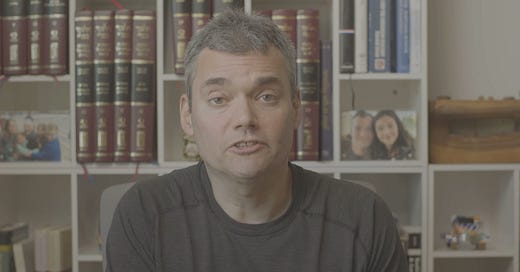Our call this week, for paid subscribers, will be on Friday at 1 PM Eastern. That will be our new regular time. (West Coast subscribers, we’ve heard you.)
Our guest will be Yale Philosophy Professor Jason Stanley, a world-renowned scholar of fascism and author of the new book, Erasing History: How Fascists Rewrite the Past to Control the Future. We’ll talk about what happened in Tuesday’s election and the fate of the struggle between liberal democracy and fascism in the United States.
Paid subscribers will get the link this Tuesday and the video the following week. They’ll also gain access to our library of past Zoom interviews with guests like Ta-Nehisi Coates, Rashid Khalidi, Thomas Friedman, Ilhan Omar, Benny Morris, Noam Chomsky, and Bret Stephens.
My New Book
Knopf will publish my new book, Being Jewish After the Destruction of Gaza, on January 28 of next year. I hope the book will contribute, in some small way, to changing the conversation among Jews about what is being done in our name. But I’m keenly aware of two things: First, Jewish voices like mine usually get more attention in the US than do Palestinian ones. Second, while I’m publishing my book, Palestinians in Gaza— and beyond— are suffering in unspeakable ways.
So, while I hope you consider buying my book, I hope you also consider buying a book by a Palestinian author. As the weeks go by, I’ll offer different suggestions, but readers should feel free to email me their own. One of the books that helped me understand the Nakba better is Raja Shehadeh’s Strangers in the House, a beautiful portrait of a relationship between a father and his son in a political environment made impossible by expulsion and oppression.
I also hope you’ll consider donating to a charity that works in Gaza. One good option is Medical Aid to Palestinians. If you have other suggestions, please send them.
Responses to My Last Video
The unnamed newsletter subscriber I cited in this week’s video about the interconnectedness between American liberal democracy and the movement for Palestinian rights is David Goldstein. Here’s how he made the case in an email to me:
“We know that the trendlines among Democrats and independents are bending inexorably towards Palestinian support and away from blind Israel fealty. If those trendlines continue - and there’s every reason to believe they will – it’s only a matter of time before a democratic America stops financing Israel’s immoral/objectiveless wars and, in turn, conditions military support on reasonable behavior. It's inevitable. There’d be no way for a candidate to emerge from a Democratic primary without professing a saner and more humane stance on the issue. That's just where the party is.
But if Trump is elected and America ceases to be a functioning democracy, this burgeoning groundswell of Palestinian support won’t have any influence on American foreign policy. A democratic regime, even a benighted spineless one, will have no choice but to respond to the political pressure an increasingly pro-Palestinian constituency exerts on it if it wishes to remain in power. A Trump-led totalitarian regime that doesn't have to worry about getting voted out of office will not only ignore this pressure, but likely criminalize it, unleash violence to suppress it.
Put another way, the choice isn't just between the two candidates on the ballot; it's a choice between 1) voting to preserve a democratic political system in which pro-Palestinian support will inevitably change the fundamentals of the conflict and 2) voting to burn this system to the ground, thus rendering this political trend irrelevant and dooming future generations of Palestinians to the status quo or worse.
So, a vote for Harris isn’t a tacit endorsement of her disappointing stance on the conflict; nor is it a willingness to countenance America’s financial support of war crimes; it’s a vote to allow an increasingly Pro-Palestinian sentiment to matter in the future. It’s about fighting for the greater long-term Palestinian (and, ultimately, Israeli) good. It’s not holding one’s nose and sacrificing principles; it’s about providing the groundwork and infrastructure to continue the fight, flawed as the vehicle to do so may be.”
Another reader, Omar Khan, emailed to argue the opposite point:
“I happen to disagree with you in a most profound way regarding your logic around voting for VP Harris for the presidential ticket. We have no argument that Trump is the far worse candidate by a long shot. The only trouble is that relativism is fairly useless here: both candidates are essentially pro genocide, which already takes up the entire moral discussion. *After* being complicit with genocide, whether one is then better on reproductive rights, immigrant issues, tax policy, and so forth – while not exactly a moot point, becomes morally much less relevant.
Many years ago, I was privileged to be taught introduction to psychology at Penn by the professor who wrote the book – Dr. Gleitman. He had as a guest professor, Dr. Marty Seligman (the originator of the theory of learned helplessness). To my 17-year-old self, it was the first time of being presented with the famous ethical dilemma of ‘the trolley problem.’ In this case, he asked, ‘you’re driving and there’s a fork in the road; on the one side is a mother with two children, and on the other side are three old people crossing the road. Whom do you hit?’ And after the class had given its view on the matter, he said – ‘you hit…The brakes.’ It didn’t quite sidestep the dilemma as much as point out that sometimes we put ourselves in moral conundrums which are completely unnecessary – by assuming that they are created by ossified, unyielding conditions and people, when in fact we need to change the question.
Before then, I was the product of a Quaker high school education and some things were clear: first, let’s not define ‘evil’ that easily; it’s a pretty high bar for something to be called that. Second, once you have called something evil, then you know what you call the lesser of two evils? Evil.”
Things to Read
(Maybe this should be obvious, but I link to articles and videos I find provocative and significant, not necessarily ones I entirely agree with.)
In Jewish Currents (subscribe!), Maya Rosen reads Parsha Bereishit against the backdrop of Gaza’s destruction.
My Beinart Notebook colleague Daniel Kaufman (pen name “cooper lit”) pens a comic about the people we love who defend the indefensible.
The best debate on voting for Harris I’ve heard. Between Mehdi Hasan and the Makdisi brothers on their podcast. (Starts at 43 min, 45 seconds.)
Donald Trump meets the New Yorker’s cartoon page.
Haaretz accuses Israel of ethnic cleansing in Gaza.
For a special Pod Save the World series about the election, I talked to Ben Rhodes about Harris, Trump, and Gaza.
Last month, I was interviewed about Zionism, antisemitism, and Gaza at the University of Alberta.
See you on Friday,
Peter
VIDEO TRANSCRIPT:
I completely understand why people are struggling to support Kamala Harris, given what the Biden administration has done and its responsibility for the destruction of Gaza, and now the destruction of significant parts of Lebanon as well. But I think that there are arguments for Harris even on the question of Palestinian rights that are worth thinking about. And there are a couple that I want to mention that are really not mine. They’re ideas that I’ve heard from other people who I really respect.
And one of them is made by the Palestinian American Democratic strategist Rania Batrice. Rania makes the point that this movement for Palestinian freedom, which has grown so much over the last year, will struggle to continue to grow under a Trump presidency in the same way, in part because the Trump presidency will put such tremendous pressure on people of progressive values, on so many issues. There will be so many crises. The crisis of mass deportation. The crisis of a government that doesn’t care about climate change. The crisis of a government that supports massive police brutality. The crisis of a government that’s appointing judges that basically put women’s lives in danger, and the lives in danger of anyone who’s having an abortion.
That all of that pressure will mean that there is less time for people to organize and work on this question of ending the war in Gaza, ending the war in Lebanon, and moving towards ending apartheid in Israel, and giving Palestinians basic human rights. And that under a Harris campaign, even though Harris herself hasn’t shown a lot of evidence that she would be better, at least it means that there won’t be much of a crisis on these other fronts, and people will afford to have more time to focus on this issue.
Somebody else who has thought about this, and I think in a real interesting way, is a subscriber to my newsletter, the Beinart Notebook, who made the point to me that I thought was a really interesting point recently that the future of the movement for Palestinian rights depends on America remaining a liberal democracy. That if we hope to see these shifts in public mood, especially in the democratic party, transform itself into a shift in government policy, that is much more likely to take place if the United States still has relatively free elections, right.
The more successful Donald Trump is in moving America towards an authoritarian system, the harder it is to translate these kinds of shifts in public opinion—especially among young people—into the political process. Trump’s threat to American liberal democracy is also a threat to the folks who want to change US policy because liberal democracy is the mechanism through which you would change US policy on Israel and Palestine. And a more authoritarian political system, one more dominated by political elites who are less accountable, is likely to be one that keeps the status quo when it comes to Palestine and Israel.











Share this post